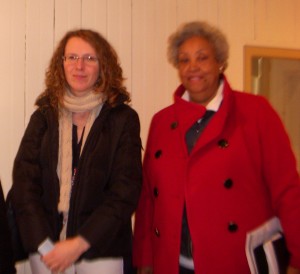

The opening of the Germantown “White House,” which emphasizes the role of African-American slaves in President George Washington’s Philadelphia home, has created a controversy about who should tell the story.
At a discussion and lecture on Thursday at Cliveden of the National Trust, entitled, “Questions in Black History,” it was clear many Germantown residents are concerned about who should tell the the stories of African Americans.
Shirley Fucron of Wynmore said, “It’s usually other people speaking for African Americans, and that’s a major concern.” Others, like Mount Airy resident Frank Tyson, questioned: “Can a white person really tell our story? Until they are honest, they should never attempt it.”
Philip R. Seitz, curator of history at Cliveden, encouraged an open discussion to the room, filled with those interested to review the recently uncovered letters from Whitehall from 1792 to 1800. The letters reveal a series of correspondence between the original occupant of the Cliveden Mansion, Benjamin Chew, to the overseers working at Whitehall, his Delaware plantation.
In response to one letter, Ari S. Merretazon, a representative from the Northeast Region Working Group, said: “When you’re beating people, what do you expect? That’s the relationship – captive and captor. There is no sanctuary in that oppression. It’s up to the descendants of these people to tell their stories.”

Prominent author, historian and the founder of the African Genesis Media Group, Edward W. Robinson, attended the meeting. “The reason I came here today is because I am trying to put together a link between Chew’s Delaware plantation and the plantation my grandfather lived on in the 1850s,” said Robinson, “His mother told him to never forget that she was raped by a boss man and held down by two overseers, and that’s how he was conceived. I’m hoping to find out who that boss man was.”
Robinson passed out a photo of the open-flesh wounds on the back of a beaten slave, saying, “The problem is that we don’t know the slaves side of the story.”
Many in attendance agreed that not only was the representation of slavery in history incomplete, but that literature written about slavery written by white authors didn’t elicit the true nature of African slavery. Books like The Confessions of Nat Turner, written by a white author William Styron, were noted as out of touch and unrealistic.
Milton McGriff, a Germantown native and author, said: “My general opinion is that white people can’t tell the story of black people. Even today, I don’t think that people are telling our story accurately. Slavery has so much physical horror, and literally a people’s culture was ripped from their minds in a systematic way.”
Harly Spry of Educators for Africa and the Association for the Study of African American Life and History discussed his visit to the University of London and his search for the European viewpoint of African-American history.
“The London professors said that if they wanted to know African-American history, they’d have to come to America and speak with a black scholar,” said Spry, “White America does not want to show its lack of humanity and acknowledge the brutality of people who describe themselves as civilized.”

The discussion flowed with a strong participation from the attendants, many nodding in agreement and expressing their feelings of misrepresentation, inaccuracy and narrow outlooks in American history books. Mary Morrow-Farrell, a Germantown native and intern at the Johnson House, discussed the approach of school systems. “I home-schooled my children so that they could learn the truth, learn about…the suffering of people just isn’t addressed the way it should be.”
Cornelia Swinson, executive director at the Johnson House, hopes that this discussion will continue and be an active one for the community. “For me, we shouldn’t just celebrate the furniture, but the life and stories of the people that lived there,” said Swinson, “We need to ask, what does history mean in terms of how work and business are conducted today? This is a timely discussion, but it also means something to me personally and to the community.”
Cliveden is currently developing a planning grant that includes making the building more concentration on African Americans.

“We want people to bring their kids, to learn and to cry for these underrepresented people in history, because they deserve it,” said Seitz, “We have plenty of room for further collaboration.”
David Young, executive director at Cliveden, agreed, saying, “Cliveden wants to engage the public in telling the full story. History is not a light bulb you can turn on and off, it’s a continued discussion.”
Future events will be held from 6:30 p.m. to 8:30 p.m. on Friday, April 16, and Friday, April 23 at Cliveden of the National Trust at 6401 Germantown Ave. The telephone is 215-848-1777. Tickets are $10 per evening at the door. No reservations required. Visit the Web site.


Thank you for this thoughtful piece.
This discussion was a a great start to the type of public discussion required for racial healing and repair. Hopefully this will lead to the development of a process for a quality townhall meeting.
Although the literature written about slavery written by white authors didn’t elicit the true nature of African slavery, they too can give aside of their side but it very much important that the former slaves state their side as well… then we share classify it as History. remember that there are two sides of history1
Good piece. I’ll also add, it’s interesting that, in trying to include African-American’s experiences in our nation’s history, we still have whites clamouring to speak on their behalf. As good an indicator as any that we still have a long way to go.